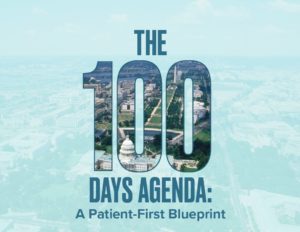 WomenHeart joined 33 organizations representing millions of people with pre-existing conditions in releasing our top policy priorities for the next Administration related to access to adequate and affordable health coverage. “The 100 Days Agenda: A Patient-First Blueprint” outlines specific steps for the President and other policymakers in the first 100 days after being sworn into office in January, a key period when there is momentum for major policy reforms.
WomenHeart joined 33 organizations representing millions of people with pre-existing conditions in releasing our top policy priorities for the next Administration related to access to adequate and affordable health coverage. “The 100 Days Agenda: A Patient-First Blueprint” outlines specific steps for the President and other policymakers in the first 100 days after being sworn into office in January, a key period when there is momentum for major policy reforms.
Specifically, the agenda urges policymakers to:
- Preserve and strengthen access to Medicaid, which provides health coverage to one in five Americans.
- Reduce availability of insurance-like products that discriminate against those with pre-existing conditions and fail to provide sufficient coverage.
- Improve access to high-quality coverage available in the Marketplace through extended open-enrollment periods, increased subsidies and more support to help patients understand their insurance options.
- Eliminate surprise medical bills, which can be financially devastating for those who call 911 when they are having a heart attack or otherwise receive the health care they need which happens to be out-of-network.
High quality, affordable health coverage means women living with and at risk of heart disease can access prevention, screening and treatment services; medical devices and equipment; and medications as prescribed or recommended. For women living with heart disease, access to adequate insurance coverage can be the difference between getting appropriate and timely care needed to manage heart disease or relying on emergency rooms, urgent care and low-cost or free health clinics for care. Women living with heart disease face a number of barriers, such as cost, which can prevent and/or impact their ability to adhere to the recommendations of their health care provider. For those at risk, including women with diabetes or depression, health insurance provides access to critical preventive services.
The Affordable Care Act (ACA) has been instrumental in increasing the number of women living with heart disease who have health insurance. Still, many women remain uninsured, with disproportionately higher rates for Native American, Latina and Black women. Especially as we continue to live through a pandemic, it is critical that the next Administration and Congress prioritize ensuring that all Americans have the health care they need to thrive.




